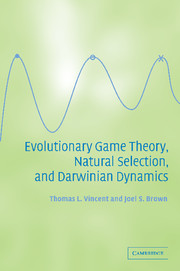Book contents
- Frontmatter
- Contents
- List of figures
- Preface
- 1 Understanding natural selection
- 2 Underlying mathematics and philosophy
- 3 The Darwinian game
- 4 G-functions for the Darwinian game
- 5 Darwinian dynamics
- 6 Evolutionarily stable strategies
- 7 The ESS maximum principle
- 8 Speciation and extinction
- 9 Matrix games
- 10 Evolutionary ecology
- 11 Managing evolving systems
- References
- Index
3 - The Darwinian game
Published online by Cambridge University Press: 11 August 2009
- Frontmatter
- Contents
- List of figures
- Preface
- 1 Understanding natural selection
- 2 Underlying mathematics and philosophy
- 3 The Darwinian game
- 4 G-functions for the Darwinian game
- 5 Darwinian dynamics
- 6 Evolutionarily stable strategies
- 7 The ESS maximum principle
- 8 Speciation and extinction
- 9 Matrix games
- 10 Evolutionary ecology
- 11 Managing evolving systems
- References
- Index
Summary
Because evolution occurs within an ecological setting, the concepts and models of population ecology are integral to evolutionary game theory. The organisms' environment and ecologies provide the “rules,” the context to which evolution responds. The transition from an ecological model to an evolutionary model can be made seamless. Examples include the Logistic growth model, Lotka–Volterra competition equations, models of predator–prey interactions, and consumer-resource models. In fact, any model or characterization of population dynamics can be reformulated as an evolutionary game. One need only identify evolutionary strategies that determine fitness and population growth rates. Conjoining an ecological model of population growth with heritable strategies puts the model in an evolutionary game setting. Not surprisingly, then, evolutionary game theory is well suited for addressing FF&F (fit of form and function) under all of nature's diverse ecological scenarios.
Games such as arms races, Prisoner's Dilemma, chicken, battle of the sexes, and wars of attrition have become standard bases for considering the evolution of many social behaviors (any issue of animal behavior offers examples of these or variants of these games). These games, however, are not unique to evolutionary ecology. They are products of and recurrent themes in economics, engineering, sociology, and political science. It is from these disciplines that game theory first emerged as the mathematical tools for understanding and solving conflicts of interest.
Information
- Type
- Chapter
- Information
- Publisher: Cambridge University PressPrint publication year: 2005
